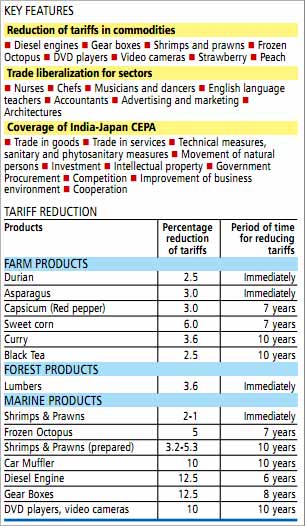 India and Japan have set a target of achieving $25 billion worth of bilateral trade by 2014 from the present $10.3 billion even as both countries have signed the much-awaited Comprehensive Economic Partnership Agreement that will see about 94 per cent tariff reduction in goods ranging from cars to shrimps and easier movement of nurses and chefs.
India and Japan have set a target of achieving $25 billion worth of bilateral trade by 2014 from the present $10.3 billion even as both countries have signed the much-awaited Comprehensive Economic Partnership Agreement that will see about 94 per cent tariff reduction in goods ranging from cars to shrimps and easier movement of nurses and chefs.
The deal was signed between Commerce and Industry Minister Anand Sharma and Japanese Foreign Minister Seiji Maehara in Tokyo.
It was formally agreed upon by Prime Minister Manmohan Singh and his Japanese counterpart Naoto Kan last year in October.
"India stands to gain significantly through this agreement and 90 per cent of tariff lines are covered while Japan has covered 5 per cent more lines than India.
"The agreement has ensured that the sensitive sectors for India are fully protected.
"These include agriculture, fruits, spices, wheat, basmati rice, edible oils, wines and spirits and also certain categories of industrial products such as auto and auto parts," said an official statement by the ministry of commerce and industry.
On a trade value basis, while Japan has agreed to 97 per cent tariff reduction in trade in goods, India has consented for 90 per cent duty abolition, according to the Embassy of Japan's communiqué.
The number of Japanese firms in India has doubled in last three years taking the total investments from Japan to India to more than 800 billion Yen, according to Japanese official data.
However, as a result of this deal companies from both countries such as Mitsubishi Religare Enterprises Ltd, Heavy Industries, Toshiba, Dai-Ichi, JSW, Hitachi, L&T, NTPC, Panasonic, Sony and Marubeni India Pvt would stand to gain.
Besides getting a liberal access to Japan's $5 trillion economy, India would also now be able to access the Japanese pharmaceutical sector while imports of petrochemicals, chemicals, textile, readymade garments, cement and jewellery would be cheaper.
Japan has also agreed to give same treatment to the Indian generics in line with its domestic pharmaceutical industry.
On several farm products, forest items and marine products such as lumbers, shrimps and prawns, durian and asparagus, there would 3-6 per cent tariff reduction immediately after the agreement comes into force by April 1.
In other agriculture and marine commodities such as black tea, frozen octopus, capsicum, curry and sweet corn, Chinese yam, peach and strawberries, tariffs would be gradually reduced in the next 7-10
In industrial goods, elimination of duties in auto parts such as diesel engines and gear boxes would be done over a period of 10 years. Similarly, duties would be reduced by about 94 per cent in DVD players, video cameras and steel sheets, plates and alloys within the next 5-10 years.
"As the majority of Japan's non-agricultural tariff lines will see immediate duty elimination for exports from India, with a strategic approach, India can significantly improve its share in Japan's total imports from the existing low level of 0.7 per cent.
India also stands to benefit in services," highlighted secretary general, Federation of Indian Chambers of Commerce and Industry, Amit Mitra.
As part of the trade in services, both countries would soon be establishing a social-security agreement, specifically for Indian qualified nurses and Japanese certified care-workers.
This agreement is expected to be signed by 2014, the consultations for which have already begun this year in January.
Under Cepa, Japan has also agreed to provide liberalised access for Indian professionals and service providers such as chefs, nurses, English language teachers, accountants, advertisers and tourist guides.
"The trade relationship between our two countries has been far below its true potential. We are certain that Cepa will lead to a quantum increase in bilateral trade and investment flows, by relaxing barriers to trade in goods, services and movement of natural persons, besides enhanced cooperation on protection of intellectual property," said president, Confederation of Indian Industry, Hari S Bhartia from Tokyo.
Both countries would be creating a sub-committee that would explore the feasibility of a Mutual Recognition Arrangement for certain specific sectors such as electrical products, telecommunications and radio equipment among others.
The sub-committee would be meeting within three months from the implementation of Cepa.
India and Japan have also agreed to the creation of a joint revolving fund of $9 billion for kick-starting the ambitious 1483-km-long Delhi-Mumbai Industrial Corridor Project running through six states of Delhi, Uttar Pradesh, Haryana, Rajasthan, Gujarat and Maharashtra.
The India-Japan global partnership summit would also take place in Tokyo from September 5-7 to promote collaboration and increase investments between both the countries.












 © 2025
© 2025